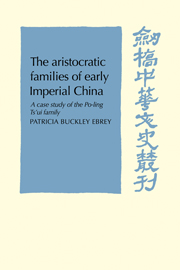Book contents
- Frontmatter
- Contents
- List of tables
- Acknowledgements
- Chronology of the Chinese dynasties
- 1 Introduction
- 2 The historical development of the aristocratic families
- 3 Origins of the Ts'uis in the Han
- 4 The Ts'uis in the aristocratic age
- 5 The Ts'uis as an old family in the T'ang
- 6 Implications and conclusions
- Notes to the text
- Appendix I The reliability of the genealogical tables in the Hsin T'ang shu
- Appendix II Annotated genealogy of the descendants of Ts'ui Yen, d. 646
- Appendix III Marriages of Po-ling Ts'uis during the T'ang
- Bibliography
- Glossary
- Index
1 - Introduction
Published online by Cambridge University Press: 04 August 2010
- Frontmatter
- Contents
- List of tables
- Acknowledgements
- Chronology of the Chinese dynasties
- 1 Introduction
- 2 The historical development of the aristocratic families
- 3 Origins of the Ts'uis in the Han
- 4 The Ts'uis in the aristocratic age
- 5 The Ts'uis as an old family in the T'ang
- 6 Implications and conclusions
- Notes to the text
- Appendix I The reliability of the genealogical tables in the Hsin T'ang shu
- Appendix II Annotated genealogy of the descendants of Ts'ui Yen, d. 646
- Appendix III Marriages of Po-ling Ts'uis during the T'ang
- Bibliography
- Glossary
- Index
Summary
It is well known that imperial China had an upper class unusual in world history. The men who occupied the highest places in the social, intellectual, and economic life of the country also provided the staff for government offices. Much of the attitudes and values of the upper class were as a consequence shaped by preparation for entry into the bureaucracy and experience as bureaucrats assigned to managing the administrative concerns of a huge empire. Yet within this common framework, social stratification underwent major shifts during the course of Chinese history. At the most general level, the imperial period can be divided into two eras, Han (202 B.C.–A.D. 220) through T'ang (618–906), and Sung (960–1276) through Ch'ing (1644–1911). In the early imperial period Chinese class structure was not radically different from that of other premodern societies; the upper class was marked by wealth, way of life, maintenance of traditional values, access to political power; non-bureaucratic ties based on family, locality, or patronage were of great significance in social and political life. It was not until the late imperial period that the features peculiar to the Chinese system were fully developed. Economic and technological changes, and above all the extension of a competitive examination system for selection of officials increased opportunities for social mobility as well as circulation of power within the upper class; these developments intensified the bureaucratic orientation of the ruling class.
- Type
- Chapter
- Information
- The Aristocratic Families in Early Imperial ChinaA Case Study of the Po-Ling Ts'ui Family, pp. 1 - 14Publisher: Cambridge University PressPrint publication year: 1978

